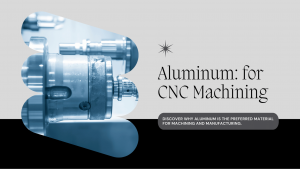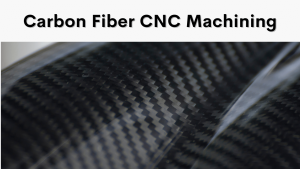De 8 Meest populaire materialen voor nauwkeurige CNC-bewerking
CNC-bewerking, Ook bekend als computer numerieke bediening, is een technologisch proces waarbij geautomatiseerde bedieningselementen en machine -tools worden gebruikt om materialen van het werkstuk af te komen. Dit helpt bij het maken van complexe onderdelen en componenten met veel nauwkeurigheid en consistentie. Het is cruciaal om de rol van materiaalselectie bij CNC -bewerking te benadrukken, Omdat het niet te veel benadrukt is. Dit komt omdat de selectie van materiaal een cruciale rol speelt bij het bepalen van de output, effectiviteit en kosteneffectiviteit van het bewerkingsproces.
Inzicht in het belang van materiaalselectie bij CNC -bewerking
Bij CNC -bewerking, Er zijn verschillende materialen te selecteren, en daarom, We moeten rekening houden met enkele factoren. De allereerste is de compatibiliteit van het materiaal met het beoogde bewerkingsproces dat wordt gebruikt. Diversiteit aan materialen heeft zijn eigen eigenschappen, zoals hardheid, Taaiheid en geleidbaarheid van warmte, Dat kan beïnvloeden hoe ze reageren op snijgereedschap en bewerkingsproces. De selectie van het materiaal dat goed kan machinaal zijn zonder te veel gereedschapslijtage te veroorzaken of het verlies van de nauwkeurigheid van het product uiteindelijk is essentieel.
Het type geselecteerde materiaal beïnvloedt ook de CNC -bewerkingsprestaties in termen van nauwkeurigheid en productiviteit. In deze context, Materialen die een hoge thermische geleidbaarheid vertonen, kunnen warmte worden die wordt gegenereerd tijdens het bewerken efficiënter, het verminderen van de neiging van thermische vervorming en het bieden van een betere dimensionale nauwkeurigheid. Ook, Materialen die machinaal zijn en gemakkelijk te verwerken kunnen zijn, kunnen minder cyclustijd hebben en minder productiekosten.
Aluminium: Het meest populaire materiaal voor CNC -bewerking
Aluminium is een van de meest gebruikte materialen in CNC -bewerkingsprocedures vanwege de vele voordelen. Aluminium is licht, maar toch sterk, De beste keuze zijn voor toepassingen waarbij gewicht de sleutelfactor is, maar zonder structurele robuustheid te verliezen. Daarnaast, Aluminium heeft een perfecte thermische geleidbaarheid, Het mogelijk maken van snelle warmtedissipatie tijdens het snijden.

Het multifunctionele karakter van aluminium maakt aluminium goed in veel industrieën. Aluminium is erg populair in de auto -industrie voor motoronderdelen, lichaamspanelen, en structurele delen vanwege de lichtgewicht kenmerken. In de luchtvaartindustrie, Aluminium is een keuzemateriaal voor de constructie van vliegtuigonderdelen zoals vleugels, romp, en landingsgestel vanwege de hoge sterkte-gewichtsverhouding. In aanvulling, Aluminium wordt het meest prominent toegepast in de productie van elektronica voor koellichamen en behuizingen, Dankzij de uitzonderlijke thermische geleidbaarheid.
Roestvrij staal: Een veelzijdig materiaal voor CNC -bewerking
Naast roestvrij staal is het ook een voorkeursmateriaalkeuze voor CNC -bewerking, omdat het een aantal uitzonderlijke eigenschappen bezit. Roestvrij staal biedt corrosieweerstand die een goede match is voor omstandigheden waarin er vocht of blootstelling is aan harde omgevingen. Het staat ook bekend om de goede mechanische kenmerken die het bezit, zoals hoge sterkte en goede ductiliteit die verantwoordelijk zijn voor het creëren van stevige en robuuste componenten.
Schijnt als staal is een uitstekende keuze voor een breed scala aan CNC -bewerkingstoepassingen vanwege de hoge veelzijdigheid. Roestvrij staal wordt vaak gebruikt in de medische industrie, Bijvoorbeeld, voor het maken van chirurgische instrumenten, implantaten, en medische hulpmiddelen vanwege de biocompatibiliteit en corrosieweerstand. De reden waarom de voedselverwerkende industrie zich vestigt op roestvrij staal als materiaal voor apparatuur en machines is dat het hygiënisch is en niet zo gemakkelijk vlekt of vervuilt als andere materialen. Bovendien, Roestvrij staal wordt veel gebruikt voor architecturale doeleinden zoals leuningen, evenals fittingen en decoraties vanwege het feit dat het aantrekkelijk en duurzaam is.
Messing: Het ideale materiaal voor precisie CNC -bewerking
Vanwege zijn verschillende eigenschappen, Messing is een voorkeursmateriaal voor bewerking door de CNC Precision Technology. Brass is een materiaal dat een uitstekende machinaliteit heeft en dit proces vereist een snelle bewerkingsbewerking en minder gereedschapslijtage. Aanvullend, Het heeft goede eigenschappen van warmteoverdracht, wat nuttig is tijdens het bewerken, omdat het helpt om de warmte te verdrijven en de mogelijkheid van thermische vervorming te verminderen.
Voordelen van CNC -bewerking met messing zijn niet beperkt tot de bewerkbaarheid ervan, Het is ook een voordeel. Messing is een esthetisch aangename gouden van kleur, dus, Dit maakt het ideaal voor decoratieve toepassingen waar iets dat aangenaam is voor de ogen is gewenst. In aanvulling, Het is meestal duurzaam tegen corrosie en te gebruiken in toepassingen met vocht- of corrosieve omgevingen.
Op precies dezelfde manier, De precisiebewerking omvat meestal de strakke toleranties en het ingewikkelde ontwerp. Omdat messing een goede materiaalkeuze is voor dergelijke toepassingen vanwege de dimensionale stabiliteit en het vermogen om strakke toleranties te behouden, Het is niet moeilijk om te zien waarom het veel wordt gebruikt in het productieproces van precisiecomponenten. Naast dat ze op grote schaal worden gebruikt in elektronica, telecommunicatie, en automotieve industrie voor precisiecomponenten, connectoren, en fittingen, Het wordt ook gebruikt als een grondstof bij de productie van optische vezels.
Kunststoffen: Het go-to-materiaal voor goedkope CNC-bewerking
Kunststoffen, verreweg, zijn de meest gekozen materialen in CNC -bewerking vanwege hun vele voordelen. Het belangrijkste voordeel van plastic tegen metalen zijn de lage kosten van de eerste. Naast betaalbaarheid, Het gemak van toegang tot kunststoffen is een andere belangrijke factor in hun brede toepassing, vooral in kostengevoelige projecten.
Plastic heeft nog een voordeel omdat ze ook ideaal zijn voor het ontwerpen van complexe vormen en de opname van ingewikkelde details die waarschijnlijk moeilijk of duur zijn om te produceren met behulp van andere soort materialen. Ze kunnen worden gemodelleerd, zo geëxtrudeerd en bewerkt in verschillende vormen dus, geschikt voor een brede arena van gebruik.
Plastic is een belangrijk type materiaal dat wordt gebruikt bij CNC -bewerking en worden geproduceerd uit verschillende soorten kunststoffen zoals ABS (Acrylonitril butadieen styreen), PVC (Polyvinylchloride), en nylon. De ene groep is anders dan de andere met betrekking tot de structuur en specifieke kenmerken, bijvoorbeeld kracht, vervormbaarheid, en chemische weerstand. Selectie van plastic materiaal wordt bepaald door de beperkingen van de betreffende toepassing.
Titanium: Het krachtige materiaal voor CNC-bewerking
Titanium als een superieur materiaal is met zijn specifieke kenmerken die vooral relevant zijn voor CNC -bewerking. Het is vooral beroemd omdat het een grote sterkte-gewichtsverhouding goedmaakt die een wenselijke factor is in toepassingen waar het gewicht kritisch is en toch de structurele integriteit niet kan worden aangetast. Titanium bezit een fantastische corrosiebestendingsvermogen, ook, Zelfs in de zwaarste omgevingen, waardoor het van toepassing is in gebieden die worden blootgesteld aan vocht of chemicaliën.
De eigenschappen van titanium die het een goede match maken voor CNC -bewerking omvat het feit dat de thermische geleidbaarheid laag is en dat het een zeer hoog smeltpunt heeft. Ze maken het mogelijk dat de warmte snel wordt afgevoerd tijdens het bewerken en veroorzaken geen toename van de temperatuur van het werkstuk. Titanium is meestal opgenomen in ruimtevaart, auto's, en medische industrieën voor componenten die zeer sterk en licht moeten zijn met lage corrosieweerstand.
Koper: Het favoriete materiaal voor elektrische componenten bij CNC -bewerking
Koper is onmisbaar voor CNC -bewerking bij de productie van elektrische componenten, omdat het een ongeëvenaarde elektrische geleidbaarheid heeft. Het heeft de grootste elektrische geleidbaarheid bij alle gemeenschappelijke metalen en als gevolg daarvan, wordt ideaal gebruikt op plaatsen waar efficiënte elektrische transmissie nodig is.
Naast de elektrische geleidbaarheid, Koper biedt niet alleen een goede thermische geleiding, maar ook hoge corrosieweerstand en hoge ductiliteit. Dergelijke functies benadrukken de toepasbaarheid van dit materiaal in gebieden waar deze eigenschappen cruciaal zijn, zoals warmtegeleiding, Duurzaamheid en vormbaarheid.
Koper is een nietje in de generatie van elektrische draden, connectoren, terminals, busbalk, en koellichamen. Goede elektromagnetische en thermische geleidbaarheid is een van de belangrijkste kenmerken waarmee het in talloze industrieën kan worden gebruikt, inclusief elektronica, telecommunicatie, en stroomopwekking.
Koolstofvezel: Het lichtgewicht materiaal voor CNC -bewerking
Koolstofvezel is een ongebruikelijk materiaal dat ultralicht is en grote sterkte en stijfheid geeft. Het is een synthese van koolstofatomen die in een roosterstructuur met elkaar zijn verbonden, Dit is de reden waarom grafeen sterker is dan staal, maar veel lichter.
De kenmerken van koolstofvezel, waarmee het kan worden bewerkt met CNC zijn de hoge sterkte-gewichtsverhouding, lage thermische expansiecoëfficiënt, en superieure vermoeidheidscapaciteit. Deze kenmerken maken de vervaardiging van lichtgewicht maar rigide onderdelen mogelijk die kunnen worden gebruikt in situaties met hoge belastingen en harde omgevingen.

Koolstofvezel is een essentieel materiaal geworden in verschillende industrieën zoals Automotive, ruimtevaart, en productie van sportuitrusting. In de autosector, Koolstofvezel kan worden gebruikt op de lichaamspanelen, chassiscomponenten, en interieur trims om het gewicht te verlagen en de brandstofefficiëntie te verbeteren. In de ruimtevaart, Koolstofvezel is de keuze van materiaal voor vliegtuigstructuren, inclusief vleugels, romp, en staartsecties, Omdat het onnodig gewicht oplevert, die de prestaties beperkt.
Het juiste materiaal kiezen voor uw CNC -bewerkingsbehoeften
Over het algemeen, Materiaalselectie is een essentieel element bij CNC -bewerking. De materiaalselectie speelt een zeer belangrijke rol in termen van of het bewerkingsproces soepel moet worden uitgevoerd, snel, en goedkoop. Aluminium, roestvrij staal, messing, kunststoffen, titanium, koper, en koolstofvezel zijn enkele van de beste materialen die worden gebruikt in CNC -bewerkingsprocessen. Elk van deze materialen heeft unieke eigenschappen en is geschikt voor specifieke toepassingsvereisten.
Tijdens het plukken van het materiaal voor CNC -bewerking, Overwegingen van compatibiliteit met het bewerkingsproces, materiële eigenschappen, en applicatie -eisen zijn met name belangrijk. Dit proces omvat nauwe samenwerking met een betrouwbare CNC-bewerkingsserviceprovider die bekwaam is in materiaalselectie- en bewerkingstechnieken om resultaten van hoge kwaliteit te produceren.
